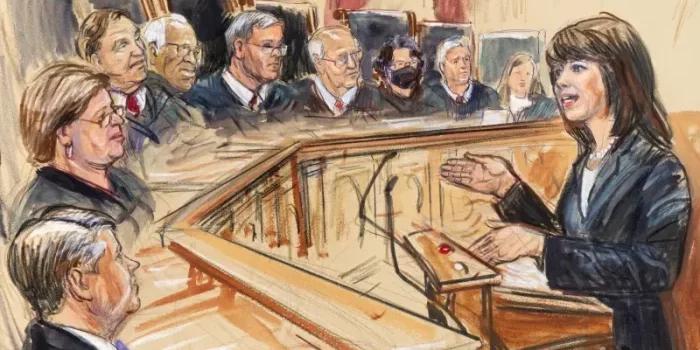(All nine U.S. Supreme Court justices brutally challenged constitutional arguments for removing former President Donald Trump from Colorado’s 2024 presidential primary ballot during arguments before the court on Thursday.
The argument is now over. The disqualification advocates may have expected a cold reception, but this was perfectly glacial. Notably, some of the toughest and most skeptical questions came from the left of the Court.
— Jonathan Turley (@JonathanTurley) February 8, 2024
With the exception of Justice Sonia Sotomayor, who was acknowledged even by leftist Harvard Law professor Lawrence Tribe to be of limited intelligence, all of the justices appeared to offer searing rebukes of the lawfare attack.
During arguments scheduled to last 80 minutes, the justices spent almost 130 minutes listening to and questioning three attorneys: Jonathan Mitchell representing Trump, Jason Murray representing six Colorado activists who filed suit last year to remove the former president from the ballot, and Shannon Stevenson representing the Colorado secretary of state.
Murray argued the Colorado Supreme Court was correct in its ruling allowing removal of Trump for his role in what they described as an “insurrection” on Jan. 6, 2021.
However, Chief Justice John Roberts laid waste to the central premise among NeverTrumpers that Trump was guilty of insurrection—a crime for which he has never been convicted and which is not among the pending federal charges for which he has been indicted.
“Insurrection is a broad, broad term,” Roberts said.
Chief Justice Roberts: "Insurrection is a broad, broad term…" pic.twitter.com/ZNPCxTridU
— CSPAN (@cspan) February 8, 2024
Stevenson claimed the Colorado secretary of state’s office—overseen by radical leftist Jena Griswold—acted within state law to remove Trump from the state ballot under the 14th Amendment of the U.S. Constitution.
However, the justices homed in on the slippery slope that it would set—potentially resulting in the removal of other candidates based on equally shaky premises.
In an answer to a question on the ramifications of the U.S. Supreme Court’s ruling, Justice Elena Kagan asked Murray why one state should be held up as precedent for the rest of the nation.
“Ultimately, it’s this court that’s going to decide the question of federal constitutional eligibility and settle the issue for the nation,” Murray said.
Roberts also asked Murray if he realized the consequences of his court’s ruling.
“If Colorado’s position is upheld, surely there will be disqualification proceedings on the other side and some of those will succeed,” Roberts said.
“Some of them will have different standards of proof. Some of them will have different rules about evidence,” he continued. “… In very quick order I would expect, although my predictions have never been correct, I would expect that a goodly number of states will say whoever the Democratic candidate is, you’re off the ballot. And others for the Republican candidate, you’re off the ballot.”
The cascade effect would lead to mass disfranchisement, resulting in major instability even as public distrust of elections has multiplied since the 2020 race.
“It’ll come down to just a handful of states that are going to decide the presidential election,” Roberts said. “That’s a pretty daunting consequence.”
Justice Ketanji Brown Jackson challenged Mitchell to clarify Trump’s belief there wasn’t an insurrection.
“For an insurrection, there needs to be an organized, concerted effort,” Mitchell said.
“This was a riot. It was not an insurrection,” he added. “The events were shameful, criminal, violent—all of those things—but did not qualify as an insurrection as that term is used” in the Constitution.
In December, the Colorado Supreme Court in a 4-3 decision ruled Trump could be removed from the March 2024 presidential primary ballot.
It overruled a district court that stated Trump’s speech on Jan. 6 “incited imminent lawless violence” but didn’t meet the standard of “engagement” found in the U.S. Constitution.
In briefs filed before Thursday’s arguments, Trump’s legal team stated the former president, as chief executive at the time, was not an “officer of the United States.”
Trump’s lawyers also argued that Section 3 of the 14th Amendment could only be enforced by the U.S. Congress, not a state.
“A ruling from this court that affirms the decision below would … take away the votes of potentially tens of millions of Americans,” Mitchell said.

